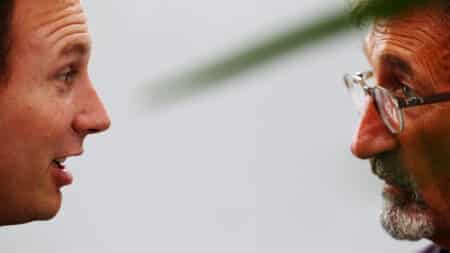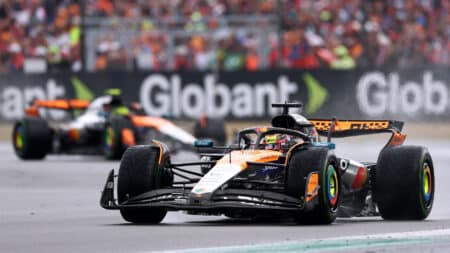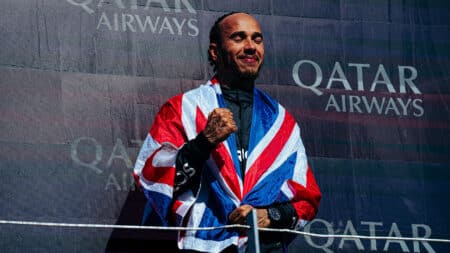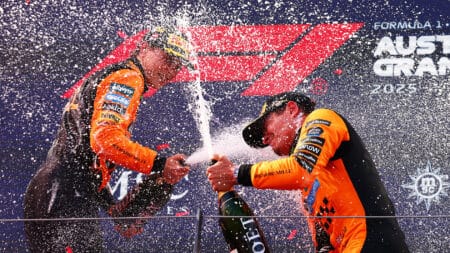
Horner's departure shows age of the maverick F1 boss is over
Christian Horner has now left Red Bull, the last of a certain breed of F1 team principal
They were an odd couple, the stooped yet tall Englishman with a stiff upper lip and clipped delivery and the little Mexican with luxuriant swept-back hair and clichéd Engleesh accent.
John Wyer and Pedro Rodríguez were united by a penchant for slicking grooming products – the former’s thinning side parting was pistol-shot straight – and a knack for winning long-distance motor races.

They joined forces for Le Mans 1968 when JW Automotive number one Jacky Ickx – already deemed by many the world’s best sports car driver – broke his leg in practice for the Canadian Grand Prix.
Ably co-driven by Lucien Bianchi, himself a replacement for the injured Brian Redman, Rodríguez’s performance during a long and stormy night – the race had been delayed until September because of political unrest in France – was of an order that only Ickx could have matched.
Carrying the team’s hopes – the other two Gulf-backed Ford GT40s had struck a sandbank and mechanical troubles early – he showcased his adaptability. Having been JWA’s fastest qualifier, he settled into a metronomic race rhythm that was easy on the car yet too tough to follow.
Wyer was impressed. Not that he told his hawkish face. He was firm but fair with drivers. Schoolmasterly by default, it was surnames-only when necessary. But nor did he care to employ genuflecting patsies.

“Racing drivers are, inevitably, strongly individual personalities,” he stated in Gulf’s 1970 promotional film A Year to Remember – in which he punctuates his to-cameras with studied cigarette semaphore and (probably) provides the inspiration for the posh criminologist narrator of The Rocky Horror Picture Show.
“If they were the sort of people who did what they were told from nine-to-five, they wouldn’t be racing drivers – or [at least] they wouldn’t be any good,“ Wyer continues. “They are the highest exponents of one of the most difficult and dangerous arts in the world and it’s no good expecting them to behave like members of the school Second XI.
“It is our business to make use of their abilities and not fight against them. We expect them to be competitive and we have no time for good losers.”
‘Deathray’ was the most famous of numerous nicknames for this formidable character. Not all were used in jest.
Respect for him, however, was universal.
He wasn’t the best payer, but otherwise insisted on the best: engineers, mechanics, cars, preparation, pit work, R&D and strategy, even hotels and food.

His drivers could see that he was doing everything within his considerable power to provide the best environment in which to succeed. They appreciated it and made the most of it.
He in turn had a well-hidden soft spot for Rodríguez. Though he speaks with genuine admiration about the tigerish Jo Siffert – even using his nickname ‘Seppi’ – he waxes lyrical about Pedro:
“[He] is, by preference, a more calculating type of driver. He likes to sit back in the early stages and watch a race develop before he stages his attack, which he does with an exquisite sense of timing.
“He has greatness [sic] of mechanical sympathy and is very kind to the car. What, I suppose, horsey people call ‘good hands’.
“He’s also capable of changing roles, either when roused, as at Brands Hatch, or when necessary.”
That victory in the 1970 BOAC 1000km is a contender for greatest wet-weather drive. Never the chattiest – he kept his distance when not going wheel to wheel – Rodríguez stared stonily ahead as Clerk of the Course Nick Syrett leaned into the fug of the Porsche 917 to berate him for overtaking under yellows.

Roused, he drove all bar 38 of the 235 laps – to win by a cool five.
Wyer: “A virtuoso performance. On that day, in those conditions, he was completely unbeatable. A personal triumph.”
Not even Ickx – already deemed by many the ‘rain master’ – could match him.
Rodríguez had spent half his young life – he began on motorbikes at 15 – reaching his pomp. The brilliance of younger brother Ricardo had caused him to overreach initially – and the shadow cast by his death in 1962 naturally undermined his desire.
Not until 1967 did Pedro join the European scene full-time, whereupon he immersed himself. He lived in the Home Counties – not far from Eton and Windsor Castle – sported a deerstalker with disarming insouciance, and drove a Bentley with a bottle of Tabasco tucked in its glovebox.
Mechanics loved him for his lack of airs and graces and press-on-regardless attitude. “A funny little chap,” according to BRM team manager Tim Parnell, his fan mail arrived at Bourne HQ by the sackful.

Deeply religious and staunchly fatalistic, he held no truck with the sport’s gathering safety campaign: God, not Jackie Stewart, decided your fate. Hence his setting of pole at Spa in 1970 when ostensibly under orders to bed-in pads while JWA and Firestone investigated a blowout.
Laid back, literally, in the cockpit, he would nip awkward interrogations in the bud with a sparkly smile, cheeky wink and sweep of that immaculate hair – he never appeared flustered, no matter the length or intensity of a stint.
When Fate caught up with him in July 1971 – at a race he needn’t have done but which he needed to do – a light went out.
When in 1958 loyal engineering lieutenant John Horsman first met the man who would become his boss for the next 18 years, he feared for a pallid Wyer’s health.
‘Deathray’, who had had tuberculosis as a child and was suffering a relapse, would in fact live for another 31 years.
His cool logic, detailed instant recall and ability to keep calm in a hostile environment allowed him to carry on after Rodríguez – and ‘Seppi’ – had gone (within three tragic months of 1971), but there was no hiding the fact that racing was never the same again.

Christian Horner has now left Red Bull, the last of a certain breed of F1 team principal

Was Oscar Piastri the real winner in the long run after Silverstone? asks James Elson

Lewis Hamilton hadn't won in almost three years – and then produced a sensational victory at Silverstone 2024. James Elson explains why it was his best ever

Describing this year's championship race as a 'battle' might be slightly over-egging it, writes James Elson